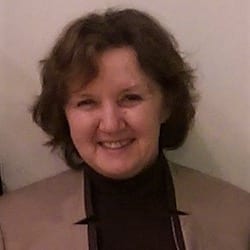2021
Eugenia Kumacheva
Chemist grows massive arrays of micro-tumours to develop precision treatment for cancer patients

2021
Chemist grows massive arrays of micro-tumours to develop precision treatment for cancer patients

University of Toronto chemist Eugenia Kumacheva is leveraging the power of automation and artificial intelligence to help identify the right drug program for individuals undergoing treatments for cancer and other diseases.
Dr. Kumacheva explores the field of “soft matter” or polymers, colloids, liquid crystals, hydrogels and living matter. She has designed and developed soft materials for use in a broad range of applications, stretching from drug delivery and tissue engineering and telecommunications and security.
In cancer treatments, her research involves growing micro-tumours.
“They can be from model (immortalized) cells, or they can be taken from patients through biopsies,” she says. “We use massive arrays of modelmaker tumours to screen individual drugs and multi-drug therapies.
“And it’s about how multiple drugs can be supplied, either mixed together or in a specific sequence, dosage, and time. For example, the first one then the second one that the third one or the first and the second together. So, there are many, many possible combinations.”
The challenge, she says, is to study all of the options at the same time. “So my lab works on tiny labs on a-chip that are the size of a credit card, allowing us to screen drug combinations in a much more efficient way.”
Her work involves automation and contributing to big data. “A lot of outputs about the next drug formulation and how it can be supplied can be assisted with machine learning,” she says. “We can use specific algorithms, in collaboration with my colleague Prof. Aspuru-Guzick, to decide what is the next experiment based on the results of the previous one.
“So I would say that this is on the forefront, because we are using automation, instead of human labour, and artificial intelligence for decision-making, which are both costly and time consuming.”
Her research holds huge potential for precision medicine in cancer. “After a surgery, cancer patients, have certain time before chemotherapy. During this time, we hope to be able to decide which drug and which drug dose and which drug combination will be the most efficient for this specific cancer patient.
“It depends on the patient’s age, gender and so on. And at the moment, this is done based on the available statistics. But in our case, if we take cells from the tumour of specific patient and grow a tumour from the cells of this particular patient, we can find what therapy would be potentially be most efficient for this particular person.”
On winning the Guggenheim Fellowship, Dr. Kumacheva says it is a “very special” honour. “It’s not just another award. When you look at list of people receiving this fellowship, it puts you in a wonderful cohort.”
The Guggenheim Fellowship will help Dr. Kumacheva hire post-docs and purchase equipment for her lab and travel to share findings with international research teams.